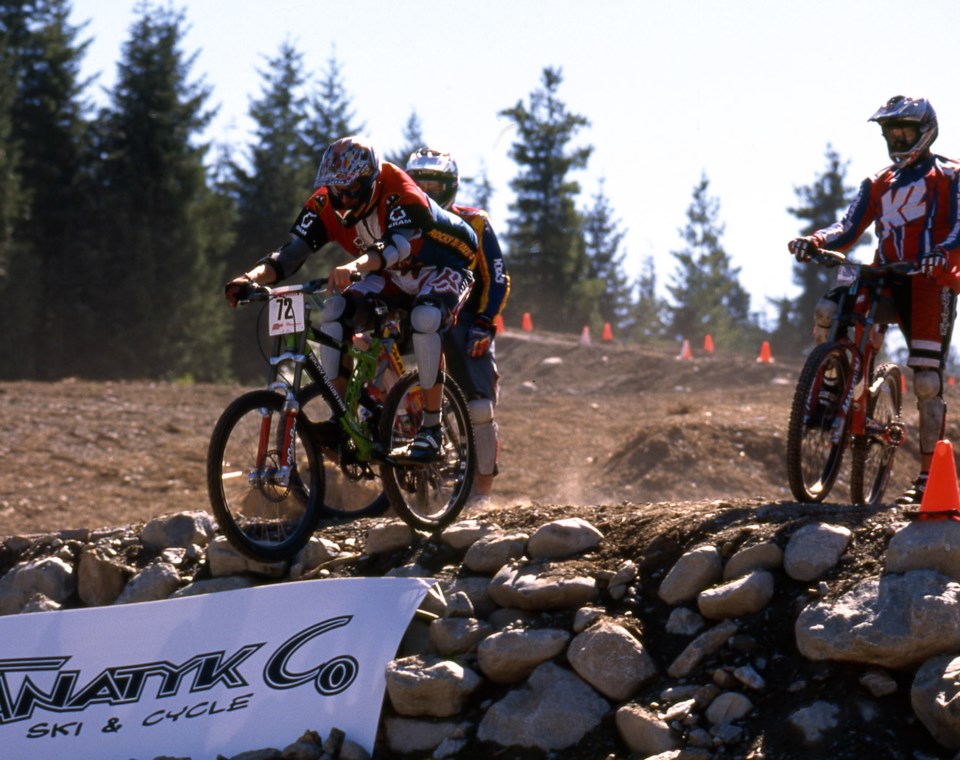Back in 2001, Whistler was slated to host the UCI (Union Cycliste Internationale) MTB World Cup Triple Crown event, but it did not go ahead. According to The Province, the UCI received 11 bids to host the event from various Whistler groups between 1991 and 1999. Only one was successful.
In 1998, Marika Koenig and Claire Bonin founded TEAM Management, an events and festivals company focused on mountain biking. That same year they executed the inaugural Whistler International Classic, an internationally-sanctioned race where pro riders could build up UCI points. Over the next two years, TEAM added the race to its new event, Summer Session, a multi-day festival that revolved around mountain biking, cycling, skateboarding, and general summer fun. From fun and competitive races to bachelor auctions, the week was jam-packed with events. Through this, TEAM showcased Whistler’s capability of hosting a World Cup event.
TEAM invested time and funds to submit an extensive bid to UCI in September 1999. It was endorsed by Cycling BC, the Canadian Cycling Association (CCA), and W3—Whistler Blackcomb, Tourism Whistler and the Resort Municipality of Whistler.
Four months later, UCI awarded the bid to Whistler. Unfortunately, the dream of hosting a World Cup in the resort did not come to fruition, as W3 wanted to take over ownership from TEAM, but did not have the expertise to do so. In December 2000, seven months out from when the Triple Crown event was supposed to take place, W3 and TEAM withdrew their intention to host the World Cup.
The Whistler community expressed disappointment, outrage, and confusion, writing letters to the local papers in support of TEAM’s role and success with other MTB events. Many questioned the real reason for backing out. The fallout caused TEAM to cancel its events planned for the summer, including the third-annual Summer Session, and end the business.
There were also concerns this fallout would affect Whistler’s bid for the 2010 Olympic and Paralympic Winter Games, since UCI president, Hein Verbruggen, sat on the International Olympic Committee (IOC) and was not too pleased with the outcome. The Olympic bid, however, remained unaffected and was awarded to Vancouver and Whistler in 2003.
In the meantime, two other resorts competed for the opportunity—Sun Peaks and Grouse Mountain. In March 2000, Grouse Mountain was confirmed to take on the Triple Crown from July 4 to 8, 2001, as well as events in the 2002 and 2003 world cups. There were concerns initially with lack of on-mountain facilities and accommodations, but the Vancouver mountain assured UCI the Skyride could transport 1,200 people per hour to make access for athletes and spectators easier. They also brought in Gestev Inc., an experienced organization known for World Cup races at Mont-Sainte-Anne, Que., and Mazatlan, Mexico. Though the event was successful, mountain biking on Grouse died down after these world cups, until this year when their new Bike Park opened this summer.
Back in Whistler, this left a void that needed to be filled by a large summer event. Since the 1980s, mountain biking had become a staple of Whistler summers, with several attempts at hosting annual events, so what was next?
Paddy Kaye and Chris Winter formed Joyride Productions in 1997 with the goal of bringing freeriding MTB events to Whistler. They helped build many of the trails on Whistler Mountain prior to Whistler Blackcomb taking over the park, and assisted with events and trail maintenance during the Summer Session festival. With the lack of major events in the summer of 2001, they brought Joyride Bikercross to the forefront and it was a massive success. The event took place a day prior to Grouse Mountain’s World Cup, a strategic choice on their end since pro riders would be close by to attend both events.
This homegrown event got bigger and better, and the slopestyle competition was introduced in 2003 when Joyride was incorporated in the Whistler Gravity Festival. A year later, the festival was rebranded to Crankworx—Whistler’s largest summer festival that now has a multi-stop world tour.




